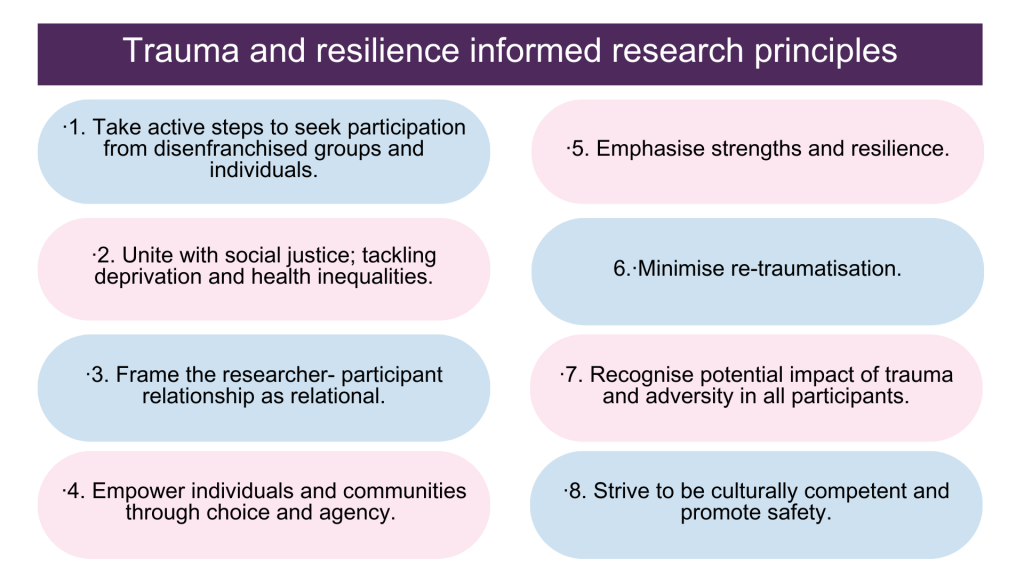How to apply a trauma and resilience-informed approach in trials
SCOPE
The trauma and resilience informed research principles and practices (TRIRPP) framework has been developed to enable researchers, including those designing trials, to apply a trauma-informed approach to their research – promoting resilience, avoiding re-traumatisation and improving study participation among those within our sampling frames who are facing trauma and chronic adversity which might otherwise preclude them from doing so.
WHY BOTHER WITH A TRAUMA AND RESILIENCE INFORMED APPROACH?
Chronic adversity and trauma are positively associated with a wide range of health conditions and many of the ‘risk behaviours’, such as problematic substance use, that are known to precipitate them[1] . Importantly this framework understands trauma to mean the neurological and psychological experiences associated with overwhelm and lack of support in the context of chronic adversity and/or singular life events such as life-threatening and abusive experiences. The importance of implementing trauma-informed care is increasingly recognised with new UK government guidance available since November 2022 Working definition of trauma-informed practice – GOV.UK (www.gov.uk).
Those facing greater adversity whether through acute trauma and/or the cumulative traumatic effect of chronic disadvantage are likely to have not only greater healthcare needs, but also fewer emotional, financial, time and other resources to access health and social care and to act on public health information[2]. These barriers may also affect willingness and ability to engage with research. Where studies are only accessible or acceptable to the most enfranchised, this then leads to the development and implementation of interventions which do not suit those who are disenfranchised, resulting in what has been termed ‘intervention generated inequalities’[3].
Those with trauma or facing chronic adversity who do participate in research may also be more likely to find participation to be an onerous experience or one which is potentially re-traumatising. Catherine White and Dr Julie Highfield have written some guidance on how to work with patient and public involvement partners in a way that is both psychologically and trauma informed.
WHAT IS THE TRAUMA AND RESILIENCE INFORMED RESEARCH PRINCIPLES AND PRACTICES FRAMEWORK?
The ‘TRIRPP’ framework is available open access HERE. It comprises eight principles aimed at improving study participation and experience. These principles have been drawn from existing frameworks and Trauma-Informed and Resilience-Informed approaches to care which have been adapted for use in health and social care research, across both quantitative and qualitative domains. Each principle offers example practices rather than an exhaustive list – it is hoped these will inspire individual teams to identify practices they can implement specific to their own studies.
Related work on principles that address chronic adversity and trauma in researchers themselves, is published elsewhere and can be obtained via the author Dr Natalie Edelman at N.Edelman@brighton.ac.uk
REFERENCES
- Marmot M. Social justice, epidemiology and health inequalities.Eur J Epidemiol 2017; 32: 537–546.
- Lin L, Savoia E, Agboola F, et al. What have we learned about communication inequalities during the H1N1 pandemic: a systematic review of the literature. BMC Public Health 2014; 14: 484.
- Lorenc T, Petticrew M, Welch V, et al. What types of interventions generate inequalities? Evidence from systematic reviews. J Epidemiol Community Health 2013; 67: 190–193.


